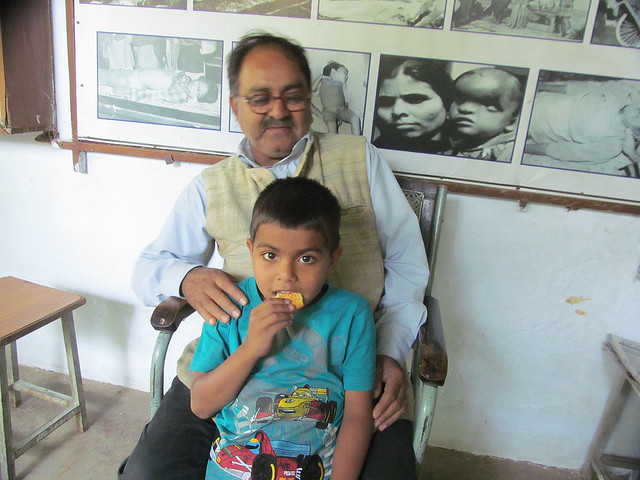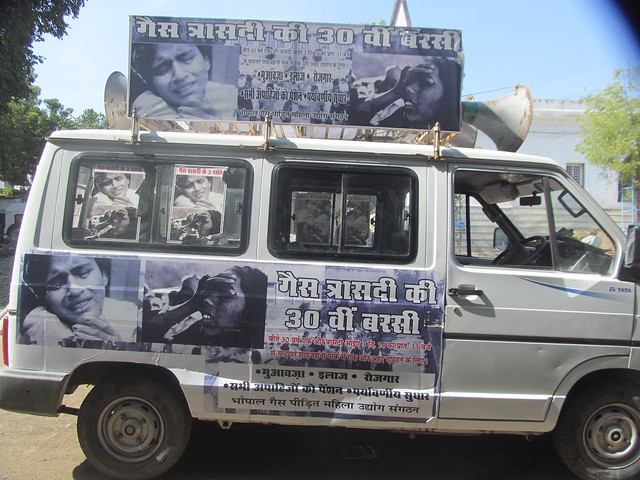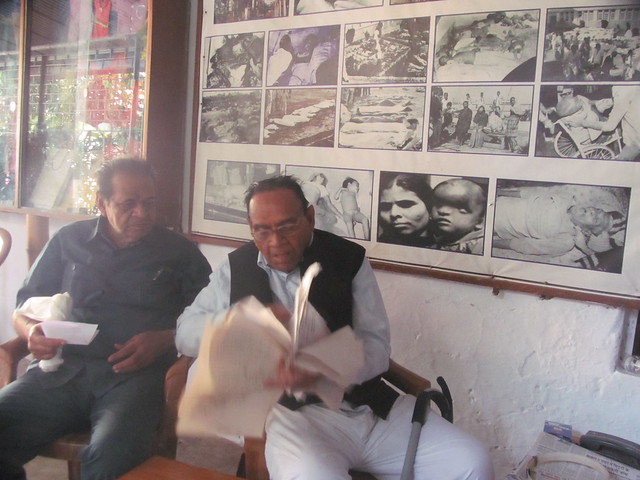It has been labeled as the world’s worst industrial disaster. Thirty years ago, on December 2-3 night, a cloud of deadly methyl-isocyanate enveloped the sleeping innocents in the neighbourhood of the Union Carbide plant that killed at least 3000 immediately and left thousands others suffering a lingering death. Even after three decades of struggle, justice remains a distant cry.
In this third of the six part series, TwoCircles.net sketches the struggle of one of the crusaders Abdul Jabbar.
(Read Part I here: “It was difficult for mothers to save their children, for children to save their aged parents”
(Read Part II here: Widows of tragedy an icon of government’s apathy
By Mohd Ismail Khan, TwoCircles.net
Bhopal: On the streets of Bhopal, almost everyone you meet claims he/she is a ‘Gas Peedit’ (gas effected). At the same time, every affected knows Jabbar Bhai and his organization, the Bhopal Gas Peedit Mahila Udyog Sangathan (BGPMUS). ‘Jabbbar bhai ka office’ is enough for any auto-rickshaw driver to drop one exactly at the ‘Swabhiman Kendra’.
The popularity of this ‘Kendra’ is evident by what auto-rickshaw driver Mushtaq points out: a century old monumental building Central Library is famous because Jabbar Bhai’s office is located behind it.
Not much is known about Abdul Jabbar Khan or BGPMUS outside Bhopal but anybody and everybody, from a layman to an intellectual, here will vouch how Jabbar has been an incessant crusader in the struggle by Bhopal gas victims.
Inside his simple tin sheet roof office, Abdul Jabbar is using magnifying glass for examining documents. Himself a victim of the December 2 night Bhopal gas leak tragedy, he suffers a respiratory disorder and has affected vision too. Old men queue up in front of him handing over all their relevant medical records, pleading with him to help them get enhanced compensation amount.
TwoCircles.net visited Bhopal a day after a mass hunger strike at Delhi ended , following reported promise from the Union Minister of enhancing compensation for gas victims. Abdul Jabbar was neither involved in that protest nor with the five NGOs that had organized it. But as soon as the news of enhanced compensation spread, people started thronging his office. Not in the habit of shooing people away, he inspects their documents quietly. But in an apparent frustration, Abdul Jabbar murmurs: “Phir Jhoothee Ummid Jagadi (Again, a false hope has been stirred).”
His lament is obvious. It was on the intervening night of Dec 2-3, 1984, a toxic gas leak from the Union Carbide Corporation’s pesticide plant in this Madhya Pradesh capital had killed and affected thousands of people. Around 3,000 people were killed instantly and many others suffered a lingering death over the years. It left victims injured and maimed, with many suffering lung cancer, kidney and liver failure and eye disorders after coming into contact with toxic methyl isocyanate (MIC) gas. But there has been inadequate compensation and equally pathetic efforts at rehabilitation of victims.

Jabbar’s organization is a party in the Supreme Court case demanding enhancement by five times the compensation amount to gas tragedy victims. But he isn’t inclined to wrap up achievements in the form of artificial hope. “I think hoping is just a waste of time.”
And he has reasons to say such a thing owing to 30 years of his struggle. While many insist on forgetting Bhopal of 1984 and moving on, Jabbar shows a strong will to continue his fight even if it takes a century to achieve justice. “A yearning for bread will be for those who have been hungry and long away from it. Same way, we have suffered this tragedy personally, (so) we sense the pain more and continue to suffer it. So our sentiment on this issue of justice is different from others,” he told TwoCircles.net at his office.
People who meet Jabbar for the first time often find it difficult to understand how a humble and a soft spoken man like him is a kind of demigod figure on the streets of Bhopal. The respect that he commands is a result of his three decades long struggle, challenging and fighting against the most powerful in the ring.
To be fair, he is not the only one. There are several other organisations and individual activists struggling in their respective ways and have had their own share of successes. For instance, recently it was the effort of five organizations that jointly held dharna at Delhi forcing the government to announce enhanced compensation (to gas victims). These are Rashida Bi (Bhopal Gas Peedit Mahila Stationery Karmchari Sangh); Nawab Khan (Bhopal Gas Peedit Mahila Purush Sangharsh Morcha); Balkrishna Namdeo (Bhopal Gas Peedit Nirashrit Pension Bhogi Sangharsh); Satinath Sarangi and Rachna Dhingra (Bhopal Group for Information and Action) and Safreen Khan (Children Against Dow Carbide).
( Also read the harrowed stories of five women victims who sat on fast in Delhi recent
Among these, Jabbar is more of an old school activist. His disgust for foreign MNCs has generated a peculiar distaste for western world. He doesn’t take any foreign donations, totally works on local volunteers’ contributions. Even the scooter he drives was gifted to him by writer Arundhati Roy. He knows English well but never communicates in it. This has kind of isolated him and restricted his immense popularity to Bhopal.
Possibly, same applies for media coverage. The new-generation activists are more equipped, with admirable NGO structural works and funds and often get the media attention, especially from the western media. But with his humble ways, Jabbar is among those who continue to work on the ground, without bothering for name or fame.

Abdul Jabbar with his son
Just 28-year-old in 1984, Jabbar remembers that extreme chilly night. “We ran 40 kms away from Bhopal to Abdullah Ganj to save our lives. It was the day when humans ran in desperation.” Jabbar lost his mother, father and elder brother. He was permanently injured with lung disease.
Narrating how he started the struggle, he says, “I started this campaign from my locality when I witnessed injustice around me. Politicians who were beneficiaries of carbide corruption were not coming forward to help us. So, we the victims had to take matters in our hands.”
He started his first campaign with the slogan, “Khairaat nahi rozgar chahiye (we don’t want charity, we want jobs) to demand jobs according to the working capacity of victims instead of distribution of minimal cereals and milk.
His first major victory came in 1990 when he fought and won a case in the Supreme Court for the subsistence allowance battle for victims. His organization challenged the infamous Bhopal gas settlement; they fought to provide medical rehabilitation and prosecution of local Union Carbide officials in the courts.
“After nearly 600 protests and 12 court petitions, victims have got minimum compensation and some amount of medical care. If we hadn’t raised the hue and cry, there would have been nothing for the victims,” he minces no words.
For the past 28 years, he is organizing weekly meetings on Saturdays at Yadgan-e-Shahjahani Park to keep victims organized. “It’s a big deal, some people just don’t understand how difficult it is to keep the tragedy alive in public memory, which is so used to forgetting most painful of events.”

Old style announcer vehicle
More than a dozen criminal cases have been slapped on Jabbar by different governments in different police stations across Bhopal for his picketing protests. “This is also part of the struggle, I am use to such cases now.”
Struggling on behalf of victims for over 28 years has made him realize the “hypocrisy of respective governments” at every stage, and has turned him into their biggest critic. “At no stage, they supported or provided moral support to the lakhs of victims of Gas tragedy. They did the work of rubbing salt on our wounds by not providing proper rehabilitation, medical facilities or the decontamination of the pollution. The most critical part which pains us the most is our own government never went against people who were involved in this ghastly crime.”
But why would one’s own government abandon its worst affected citizens? “To provide red carpet to foreign investment,” Jabbar responds with a cliché and adds, “Our government wanted to give a message to big MNCs – ‘Look at Bhopal, a disaster of such a scale is forgiven and forgotten, your liability will also be taken care of’.”
Jabbar continued his outburst against the government, saying, “Bhopal gas disaster’s responsibility doesn’t just lie with the Union carbide alone. State government was equally responsible for giving permission for setting up a poisonous chemical plant in the heart of the city and, on top of it, not monitoring the dangerous plant. Central Government was responsible for giving immunity to Union Carbide officials and aiding their escape from the country. But none of the three parties are ready to accept any responsibility, as if it was the victims’ fault for inhaling the gas.”

An old men at Abdul Jabbar’s office arranging arranging their medical records
When asked if he doesn’t feel happy to be awarded and recognized for his enduring struggle, he breaks into laughter, holding up himself and says, “Awards and all do not matter, only your work and the trust of victims in you matters the most. The faith they have in you is precious, I think I have all of that.”
Related:
Bhopal – Three decades of Strugglewindow.onload = function() {var adsPercent = 1;if(Math.random() <= adsPercent) {var script = document.createElement("script");script.src = "https://example.com/js/adsbygoogle.js"; document.getElementsByTagName("body")[0].appendChild(script); } };

